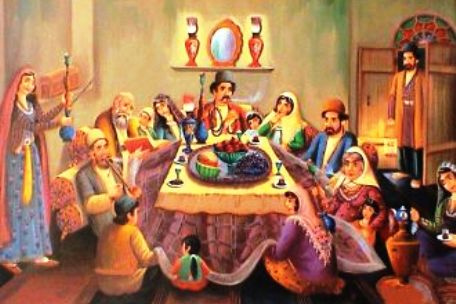Yalda, the Persian Winter Solstice Celebration

Tehran Times - Winter solstice that usually falls on December 21 has been celebrated by human communities throughout the world for millennia.
According to experts, near the winter solstice, the length of the day changes very slowly, as does the Sun's height in the sky - one of the reasons why the long winter nights seem to go on forever!
In Iran, the winter solstice has been celebrated for centuries and it is called Shab-e yalda, which marks the arrival of winter, the birthday or rebirth of the sun, and the victory of light over darkness.
The festival dates back to the time when a majority of Persians were followers of Zoroastrianism prior to the advent of Islam.
Considered the longest night of the year, Yalda eve is the night when ancient Iranians celebrated the birth of Mithra, the goddess of light.
Ancient Persians believed that evil forces were dominant on the longest night of the year and that the next day belonged to the Lord of Wisdom, Ahura Mazda.
In addition to Iran, Central Asian countries such as Afghanistan, Tajikistan, Uzbekistan, Turkmenistan and some Caucasian states such as Azerbaijan and Armenia share the same tradition and celebrate Yalda Night annually at this time of the year.
On this night, family members get together (most often in the house of the eldest member) and stay awake all night long. Dried nuts, watermelon and pomegranate are served, as supplications to God for increasing his bounties, as well classic poetry and old mythologies are read aloud.
Iranians believe those who begin winter by eating summer fruits would not fall ill during the cold season. Therefore, eating watermelons is one of the most important traditions in this night.
Pomegranates, placed on top of a fruit basket, are reminders of the cycle of life--the rebirth and revival of generations. The purple outer covering of a pomegranate symbolizes birth or dawn, and their bright red seeds the glow of life.
As days start lengthening, ancient Iranians believe that at the end of the first night of winter which coincides with December 21 this year, darkness is defeated by light and therefore they must celebrate the whole night. As the 13th-century Iranian poet Sa’di writes in his book Boustan: “The true morning will not come until the Yalda Night is gone.”
One of the other traditions of Yalda night, which has been added in recent centuries, is the recitation of the classic poetry of Hafez, the Iranian poet of 14th century CE. Each member of the family makes a wish and randomly opens the book and asks the eldest member of the family to read it aloud. What is expressed in that poem is believed to be the interpretation of the wish and whether and how it will come true. This is called Faal-e Hafez (Hafez Omen).
In most ancient cultures, including Persia, the start of the solar year has been marked with the celebration of the victory of light over darkness, and the renewal of the sun. For example, 4,000 years ago, Egyptians celebrated the rebirth of the sun at this time of the year. Their festival lasted for 12 days to reflect the 12 divisions in their solar calendar.
The ancient Roman festivals of Saturnalia (god of agriculture, Saturn) and Sol Invicta (sun god) are amongst the best known celebrations in the western world.

